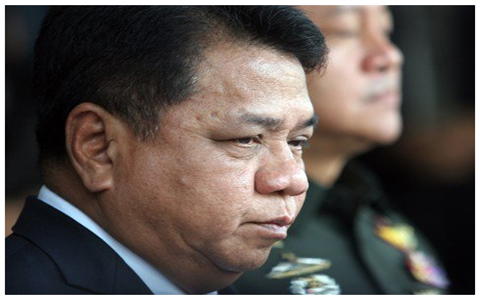NSC chief is in favour of peace talk for southern conflict
 The National Security Council is in full support of peace dialogue to bring about peaceful solution to the violence in the far South and of the concept of special administrative zone.
The National Security Council is in full support of peace dialogue to bring about peaceful solution to the violence in the far South and of the concept of special administrative zone.
In an exclusive interview with the Isra news agency, NSC secretary-general Pol Gen Wichien Poteposri explained that peace dialogue with the separatist groups was part and parcel of the policy of using politics rather than military means to resolve the violence in the three southernmost provinces and five districts of Songkhla province where separatist gangs are active.
He said that the use of military means alone would exhaust the security forces and would not bring about a solution to the violence. "It has to be complemented with political means which has been clearly stated in the NSC’s policy framework – that is there must be a process leading to dialogue, peace and decentralisaton of power in correspondence with the culture and way of life of the local people," said the NSC chief.
Pol General Wichien said that the policy on southern border provinces administration and development which was recently approved by the parliament had been carefully crafted after several rounds of public hearings being staged in and out of the country. Therefore it is a policy which has been highly recognized, he added.
Although the NSC is supportive of a peaceful solution through dialogue, the NSC chief said that the solution is conditional – that is it must not lead to territorial separation.
As for the concept of a special administrative zone, he explained that the government’s decentralization policy has allowed the setting up of special administrative bodies such as or bor tor (Tambon Administration Organisation), or bor jor (Provincial Administration Organisation) or tessabaan (municipal).
Emphasising the importance of territorial integrity, the NSC chief voiced his opposition to the proposed Pattani Maha Nakhon plan which seeks to group Pattani, Narathiwat and Yala provinces together under a single special administrative zone with an elected governor.
He noted that Pattani Maha Nakhon proposal might go against the decentralization policy and could be misinterpreted as a state within a state.
As for emergency act which has been enforced in the three southernmost provinces with the exception of Mae Larn district in Pattani for seven years, Pol Gen Wichien admitted that there might be a problem in the process of the monitoring of the enforcement of the law which has been heavily criticised by human rights advocacy groups.
He specifically pointed out at the power under the emergency act which allows authorities to detain suspects for up to 30 days without formal charges, saying that this has always been the cause of complaints from many local people and religious leaders. He said that the law prescribes a check-and-balance mechanism in the form of the Emergency Administrative Committee to prevent abuses of the law but the committee met only three times since it was established in 2005.
If the law has to be abolished, then it will have to. Or it can be lifted in certain areas, said the NSC chief.
----------------------------------------------------------------------------------------------------------------------------
Thanks : Photo from www.bangkokbiznews.com
